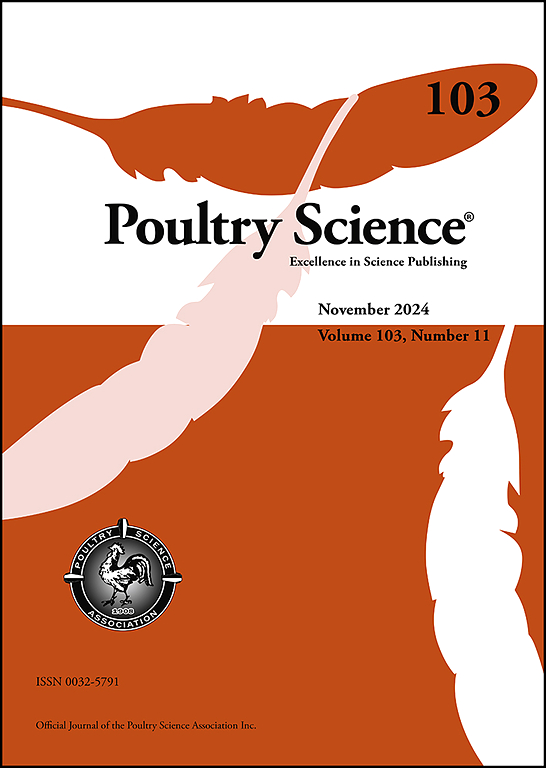The chicken major histocompatibility complex (MHC-B) and alloantigen systems A, D, E, and I impact resistance to coccidiosis
IF 3.8
1区 农林科学
Q1 AGRICULTURE, DAIRY & ANIMAL SCIENCE
引用次数: 0
Abstract
Coccidiosis, a major poultry protozoal disease caused by several Eimeria species, compromises gut health causing significant losses. This study assessed the association of haplotypes of the major histocompatibility complex (MHC) and other blood alloantigens found in commercial egg production chickens with resistance to coccidiosis. Pedigreed White Leghorn offspring segregating for the MHC-B region, plus four additional alloantigen systems A (C4BPM), D (CD99), E (FCAMR), and I (RHCE) were tested for differential resistance to coccidiosis in five 26-day (d) trials (n= 235 birds in total). On d 19, all birds were inoculated with a cocktail of E. acervulina, E. maxima, and E. tenella oocysts and allocated to individual cages. Phenotypes evaluated included body weight gain (BWG), feed intake (FI), feed conversion ratio (FCR), gross and microscopic lesion scores (GLS and MLS), and oocyst shedding (oocysts per gram, OPG). Haplotypes of the five blood systems were determined by SNP genotyping. A positive and negative association means an increase and decrease in a phenotypic trait, respectively, with each additional copy (0, 1 or 2) of a given haplotype. Results were considered statistically significant at P ≤ 0.05. The CD99-H01 haplotype association was positive with BWG but negative with FCR. Genotype B21B21 had the highest GLS in the jejunum establishing a positive association between MHC B21 and jejunal GLS. Further, the B12B15 genotype had a lower E. maxima OPG compared with the B12B21 genotype. The I system I-H01 haplotype had a negative association with jejunal and cecal GLS. Duodenal GLS was lower in E-H02/H02 compared to the E-H07/H07 genotype of the E system. Haplotypes B21, blood systems D-H01, E-H02, and I-H01 were associated with improved resistance to coccidiosis. The association of specific haplotypes of the MHC-B and other alloantigen systems D, E, and I with resistance and susceptibility traits during mixed Eimeria infection underscores the need for further investigations of these haplotypes’ effects on coccidiosis resistance in commercial lines, validating the inclusion of different blood systems in selection programs.
鸡主要组织相容性复合体(MHC-B)和异体抗原系统A、D、E和I影响对球虫病的抗性
球虫病是由几种艾美耳球虫引起的一种主要的家禽原生动物疾病,危害肠道健康,造成重大损失。本研究评估了在商品产蛋鸡中发现的主要组织相容性复合体(MHC)单倍型和其他血液同种抗原与球虫病抗性的关系。在5个为期26天的试验中(共235只),检测了MHC-B区分离的白来鸿纯种后代以及另外4个异体抗原系统A (C4BPM)、D (CD99)、E (FCAMR)和I (RHCE)对球虫病的差异抗性。在第19天,所有的鸟都接种了针状芽孢杆菌、最大芽孢杆菌和柔嫩芽孢杆菌的混合卵囊,并分配到单独的笼子里。评估的表型包括体重增加(BWG)、采食量(FI)、饲料转化率(FCR)、肉眼和显微镜下病变评分(GLS和MLS)和卵囊脱落(每克卵囊数,OPG)。通过SNP基因分型确定5种血液系统的单倍型。正相关和负相关意味着随着给定单倍型的每增加一个拷贝(0,1或2),表型性状分别增加和减少。P≤0.05认为结果有统计学意义。CD99-H01单倍型与BWG呈正相关,与FCR呈负相关。基因型B21B21在空肠的GLS最高,说明MHC B21与空肠GLS呈正相关。此外,与B12B21基因型相比,B12B15基因型的E. maxima OPG较低。I系统I- h01单倍型与空肠和盲肠GLS呈负相关。与E系统的E-H07/H07基因型相比,E-H02/H02型十二指肠GLS较低。单倍型B21、血液系统D-H01、E-H02和I-H01与球虫病抗性增强相关。在混合艾美耳球虫感染期间,MHC-B和其他同种异体抗原系统D、E和I的特定单倍型与抗性和易感性性状的关联强调了进一步研究这些单倍型对商业品系球虫抗性的影响的必要性,验证了在选择程序中包含不同血液系统的必要性。
本文章由计算机程序翻译,如有差异,请以英文原文为准。
求助全文
约1分钟内获得全文
求助全文
来源期刊

Poultry Science
农林科学-奶制品与动物科学
CiteScore
7.60
自引率
15.90%
发文量
0
审稿时长
94 days
期刊介绍:
First self-published in 1921, Poultry Science is an internationally renowned monthly journal, known as the authoritative source for a broad range of poultry information and high-caliber research. The journal plays a pivotal role in the dissemination of preeminent poultry-related knowledge across all disciplines. As of January 2020, Poultry Science will become an Open Access journal with no subscription charges, meaning authors who publish here can make their research immediately, permanently, and freely accessible worldwide while retaining copyright to their work. Papers submitted for publication after October 1, 2019 will be published as Open Access papers.
An international journal, Poultry Science publishes original papers, research notes, symposium papers, and reviews of basic science as applied to poultry. This authoritative source of poultry information is consistently ranked by ISI Impact Factor as one of the top 10 agriculture, dairy and animal science journals to deliver high-caliber research. Currently it is the highest-ranked (by Impact Factor and Eigenfactor) journal dedicated to publishing poultry research. Subject areas include breeding, genetics, education, production, management, environment, health, behavior, welfare, immunology, molecular biology, metabolism, nutrition, physiology, reproduction, processing, and products.
 求助内容:
求助内容: 应助结果提醒方式:
应助结果提醒方式:


